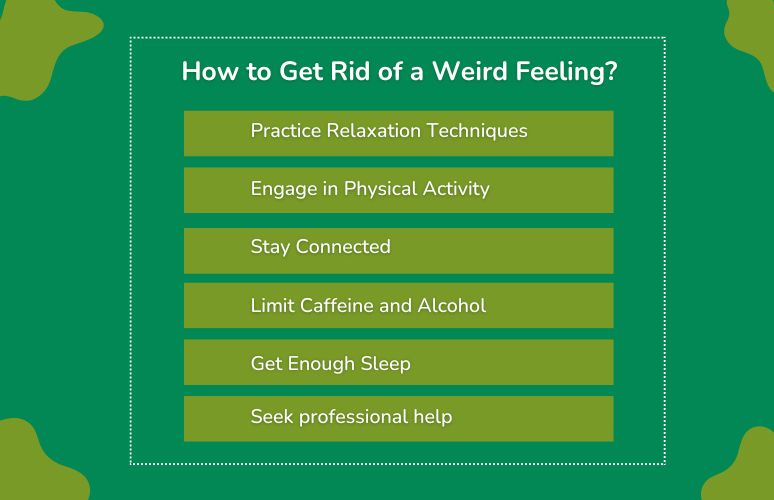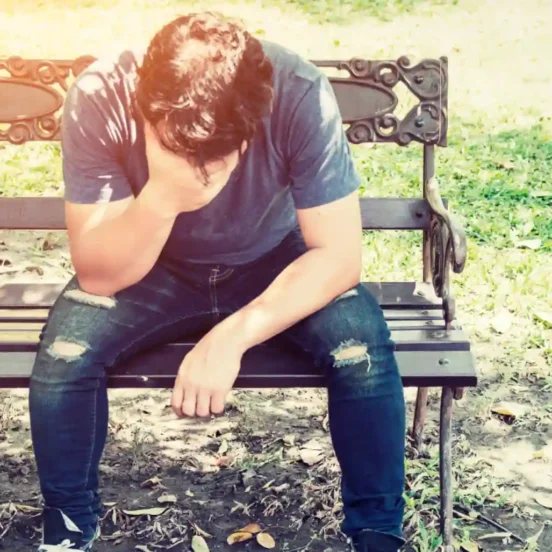Why Do I Feel Weird? Exploring the Reasons Behind It
Feeling weird is a common experience that many people encounter at some point in their lives. It’s that vague sense of discomfort or unease that can be hard to pinpoint or explain. You might feel disconnected from reality, out of sync with your surroundings, or just not quite like yourself. This sensation can be disconcerting, but it’s important to know that it’s usually temporary and often not a cause for alarm.
People of all ages, genders, and backgrounds can experience this feeling of weirdness from time to time. Whether you’re a teenager navigating the ups and downs of adolescence, a busy parent juggling work and family responsibilities, or a retiree adjusting to life’s changes, feeling weird is something that can affect anyone.
In this blog, we’ll explore some of the common reasons why you might be feeling weird and what you can do about it. So, if you’ve ever found yourself wondering, “Why do I feel weird?” you’re in the right place! Let’s find some answers.
What Causes a Person to Feel Weird?
There are several potential causes behind that unsettling feeling of weirdness. One common reason is stress. When you’re under a lot of stress, whether it’s due to work, school, relationships, or other factors, your body can go into a state of high alert, which can leave you feeling out of sorts.
Lack of sleep is another common culprit. When you’re not getting enough rest, it can affect your mood, your cognitive function, and your overall sense of well-being, leading to that weird, disconnected feeling. Hormonal changes, such as those experienced during puberty, pregnancy, or menopause, can also play a role.
Additionally, certain medical conditions, such as anxiety disorders, depression, or thyroid problems, can cause feelings of weirdness. Finally, substance abuse or withdrawal from drugs or alcohol can also lead to this sensation.
It’s important to remember that feeling weird is a normal response to certain situations and experiences, but if it’s persistent or accompanied by other troubling symptoms, it’s a good idea to talk to a healthcare professional.
I Feel Weird Physically But Can’t Explain It
When you’re experiencing physical sensations that you can’t quite put into words, it can be incredibly frustrating. You might feel strange twinges or tingling sensations, or you might have a general feeling of discomfort without being able to pinpoint the cause.
One reason why you might struggle to explain these feelings is that they could be caused by anxiety or stress. When your body is under stress, it can manifest in a variety of physical symptoms, from muscle tension to stomach upset to dizziness or lightheadedness.
These sensations can feel strange or unfamiliar, making them difficult to describe. Additionally, certain medical conditions, such as fibromyalgia or chronic fatigue syndrome, can cause a wide range of physical symptoms that may be hard to explain. If you’re experiencing unexplained physical symptoms, it’s important to talk to a healthcare professional to rule out any underlying medical conditions.
- Anxiety or stress: When your body is under stress, it can manifest in a variety of physical symptoms, such as muscle tension, stomach upset, dizziness, or lightheadedness.
- Medical conditions: Certain medical conditions, such as fibromyalgia or chronic fatigue syndrome, can cause a wide range of physical symptoms that may be hard to explain.
Why Do I Feel Weird But Nothing Is Wrong?
Anxiety and stress: Feeling weird when nothing is wrong can often be attributed to anxiety or stress. Your body’s “fight or flight” response can be triggered by everyday stressors, leading to physical symptoms like a racing heart, shallow breathing, or muscle tension, even when there’s no immediate threat.
Hypersensitivity: Sometimes, feeling weird when nothing is wrong can be a result of hypersensitivity to your body’s normal functions. You might become overly aware of your heartbeat, your breathing, or other bodily sensations, leading to a feeling of unease or discomfort.
Changes in brain chemistry: Fluctuations in brain chemistry can also lead to feelings of weirdness. For example, low levels of serotonin, a neurotransmitter that helps regulate mood, can lead to feelings of anxiety or unease even when there’s no apparent reason for it.
Depersonalization/derealization: Depersonalization and derealization are dissociative disorders that can cause you to feel detached from yourself or your surroundings, leading to a sense of unreality or weirdness.
Transient ischemic attack (TIA): Sometimes referred to as a “mini-stroke,” a TIA can cause temporary symptoms similar to those of a stroke, such as numbness or weakness in the face, arm, or leg, confusion, trouble speaking or understanding speech, and trouble seeing in one or both eyes. If you experience any of these symptoms, seek medical attention immediately, as a TIA can be a warning sign of a more serious stroke to come.
Paranoia VS Anxiety
Paranoia and anxiety are both common mental health issues, but they are different in nature and can have distinct effects on a person’s well-being. While they may share some similarities, understanding the differences between them is important for effective treatment and management.
| Paranoia | Anxiety |
| Paranoia is an irrational fear or suspicion of others, often accompanied by the belief that you are being persecuted, spied on, or harmed in some way. | Anxiety is a general feeling of unease, worry, or nervousness that is often related to an imminent event or something with an uncertain outcome. |
| Paranoia can cause you to interpret neutral or even positive situations as threatening, leading to feelings of fear, mistrust, and suspicion. | Anxiety can cause physical symptoms such as rapid heartbeat, sweating, trembling, and difficulty breathing, as well as cognitive symptoms such as racing thoughts, difficulty concentrating, and irrational fears or worries. |
| Paranoia is often associated with severe mental health conditions such as schizophrenia, but it can also occur in people with other mental health disorders or as a result of substance abuse. | Anxiety disorders, on the other hand, are a group of mental health conditions characterized by excessive, persistent worry or fear that is out of proportion to the actual danger or threat. |
Why Do I Feel Like Something Bad Is Going to Happen?
Feeling like something bad is going to happen is a common experience, and it can be caused by a variety of factors. One possible explanation is anxiety. When you’re anxious, your body’s “fight or flight” response is activated, causing a surge of adrenaline that can make you feel on edge and hyper-alert.
This heightened state of arousal can lead to a sense of impending doom or a feeling that something bad is about to occur, even if there’s no obvious reason for it. Additionally, past experiences of trauma or negative events can contribute to this feeling, as your brain may be hyper-vigilant for signs of danger in order to protect you from harm in the future.
Finally, certain mental health conditions, such as generalized anxiety disorder or panic disorder, can cause persistent feelings of fear or apprehension that something bad is going to happen. If you’re experiencing these feelings frequently or they’re interfering with your daily life, it’s important to talk to a healthcare professional for support and guidance.
How to Get Rid of a Weird Feeling?
When you’re experiencing a weird feeling that you can’t shake, it’s natural to want to find relief as quickly as possible. Fortunately, there are several strategies you can try to help alleviate that unsettling sensation and get back to feeling like yourself again.

Practice relaxation techniques: Deep breathing, progressive muscle relaxation, meditation, or yoga can help calm your mind and body, reducing feelings of stress and anxiety.
Engage in physical activity: Exercise is a great way to release tension and boost your mood. Even a short walk around the block can help clear your head and improve your outlook.
Stay connected: Reach out to friends or loved ones for support. Talking about your feelings with someone you trust can help you gain perspective and feel less alone.
Limit caffeine and alcohol: Both caffeine and alcohol can exacerbate feelings of anxiety and make you feel more on edge. Try cutting back or eliminating them from your diet to see if it helps.
Get enough sleep: Poor sleep can exacerbate feelings of weirdness and make it harder to cope with stress. Aim for 7-9 hours of quality sleep per night to help regulate your mood and improve your overall well-being.
Seek professional help: If your weird feelings persist or interfere with your daily life, don’t hesitate to reach out to a mental health professional for support and guidance. Therapy, medication, or other treatments may be able to help you feel better and regain your sense of well-being.
Can Stress Cause Hallucinations
Stress is a common and natural response to life’s challenges, but it can sometimes have unexpected effects on our mental health. While it’s not common, severe or prolonged stress can, in some cases, lead to hallucinations. Hallucinations are sensory experiences that seem real but are created by the mind.
They can affect any of the senses, including sight, hearing, smell, taste, and touch. When you’re under a lot of stress, your brain may become overwhelmed, leading to disruptions in perception and sensory processing. This can sometimes result in hallucinations, such as hearing voices or seeing things that aren’t there.
If you’re experiencing hallucinations or other symptoms of stress, it’s important to seek support from a healthcare professional. With the right treatment and support, you can learn to manage your stress and reduce the likelihood of experiencing hallucinations in the future.
Closing Note
Feeling weird is a common experience that can be caused by a variety of factors, including stress, anxiety, physical health issues, and changes in brain chemistry. While it can be unsettling, it’s important to remember that these feelings are usually temporary and often not a cause for alarm. By understanding the potential reasons behind why you might be feeling weird and taking steps to address them, you can regain your sense of well-being and get back to feeling like yourself again.
If you’re struggling with persistent or concerning symptoms, don’t hesitate to reach out to a healthcare professional for support and guidance. Remember, you’re not alone, and help is available.















